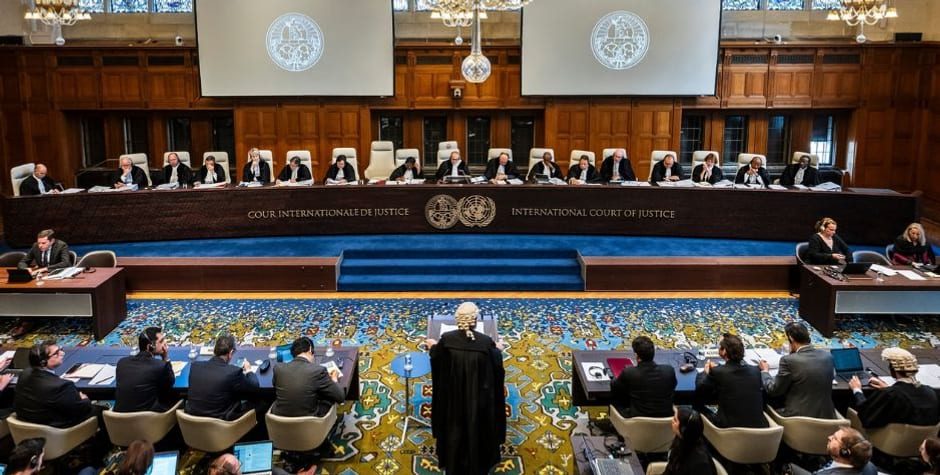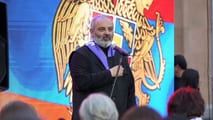

Azerbaijan Still Denies Ethnic Cleansing of Nagorno-Karabakh Armenians
Azerbaijan Still Denies Ethnic Cleansing
Before the International Court of Justice, which is holding public sittings from April 15 to 26, 2024, Azerbaijan is still refusing to recognise the ethnic cleansing of the Armenians of Nagorno-Karabakh, which began during the war of September 2020 and ended with the conquest of September 2023.
Photographie: UN Photo/ICJ-CIJ/Frank van Beek. Courtesy of ICJ for non-commercial educational use.
"Why, in September of 2023, did more than 100,000 ethnic Armenians, including 30,000 children, within a matter of days, flee from their ancestral homeland as the Azerbaijani army approached?" asked Sean Murphy, representing Armenia, before the judges of the International Court of Justice (ICJ). "Why did so many people, who Azerbaijan claims to be its own citizens, desperately flee for their lives?” The lawyer also asks whether it is possible that they anticipated "not just the destruction of their democratic institutions, and not just the “final cleaning” of those ruins," staged by Azerbaijani President Ilham Aliyev with a bonfire in Stepanakert, the capital of Nagorno-Karabakh, "but of their own “final cleansing” if they did not flee."
From April 15 to 19, 2024, the principal judicial organ of the United Nations (UN) held public sittings on the preliminary objections raised by Azerbaijan in the case concerning the application of the International Convention on the Elimination of All Forms of Racial Discrimination (CERD), instituted by Armenia in September 2021. This week, Armenia is in turn attempting to prove that Azerbaijan's allegations are inadmissible by the Court.
Mutual accusations of "ethnic cleansing" and racism
"Armenia failed to engage in negotiations with Azerbaijan in an attempt to settle that dispute" and its application against Azerbaijan for violations of the CERD is therefore "premature", says Elnur Mammadov, representing Azerbaijan before the judges of the International Court of Justice (ICJ). "From the outset, Armenia had its sights firmly set on commencing these proceedings before the Court and using the fact of these proceedings to wage a public media campaign against Azerbaijan", adds the agent. But for Yeghishe Kirakosyan, another Armenian representative, “Azerbaijan’s racist violence, arbitrary detention and enforced disappearances perpetrated against ethnic Armenians are plainly capable of falling within the CERD.”
The two neighbouring States have accused each other of "ethnic cleansing" since their territorial dispute following the collapse of the USSR in 1991. Azerbaijan blames Armenia for being motivated “by an overtly racist and nationalist ideology known as Tseghakron. This racist ideology espouses the notion of a superior Armenian “Aryan” race, the racial inferiority of Azerbaijanis and the unification of all ethnic Armenians within a single, mono-ethnic Armenian State extending into the internationally recognized sovereign territories not only of Azerbaijan, but also of other neighbouring States.”
Armenia responds by deploring “the general Armenophobia that has been espoused and cultivated by the Government of Azerbaijan”, triggering “a climate in which literal axe murderers are awarded, promoted and glorified as national heroes for killing Armenians in peacetime.”
Azerbaijan does not respect the decisions of the International Court of Justice
These public sittings serve only to determine the admissibility of Armenia's application and the jurisdiction of the International Court of Justice. It will be several more years before the merits of the case are decided. In the meantime, Armenia may request provisional measures on a provisional basis, if it considers that the rights which are the subject of its application are in immediate jeopardy. Provisional measures are binding, as was the restoration of free access to the Lachin corridor, but the Court does not have the means to enforce them.
On November 17, 2023, following the mass forced exodus of almost all of the 120,000 Armenians from Nagorno-Karabakh who had been bled dry after nine months of blockade, the Court ordered Azerbaijan to allow them to return or leave "in a safe, unimpeded and expeditious manner" or to remain with the condition of being "free from the use of force or intimidation that may cause them to flee." To date, the ethnic cleansing of the Armenians of Nagorno-Karabakh has continued amid general indifference, with only around thirty of the 150,000 Armenians who lived there before the war in 2020 still alive, and 200 still missing.
Ethnic cleansing of Nagorno-Karabakh Armenians and their cultural and religious heritage
"After threatening to do so for years, Azerbaijan has completed the ethnic cleansing of the region and is now consolidating it by systematically erasing all traces of ethnic Armenians’ presence, including Armenian cultural and religious heritage” deplores Yeghishe Kirakosyan. The European Centre for Law and Justice (ECLJ) has denounced this threat to the UN Secretary-General. In its resolution of 13 March 2024, the European Parliament also warned of the "considerable deliberate damage" suffered by Armenian heritage during the war of 2020, which still suffers from "the failure to safeguard," while it is "at risk" because of its "systematic destruction" by Azerbaijan.
According to Yeghishe Kirakosyan, "Azerbaijan has been increasingly characterizing Armenia’s human rights claims, whether before the Court or in Strasbourg, as some sort of challenge to Azerbaijan’s sovereignty or territorial integrity." Indeed, the Parliamentary Assembly of the Council of Europe decided to suspend Azerbaijan's delegation on January 24, 2024, a decision encouraged by the ECLJ. But the agent wants to be conciliatory: "Azerbaijan is profoundly mistaken. Armenia has no claims to Azerbaijan’s territory and is also committed to establishing the conditions for a genuine and enduring peace."
Still pending demarcation of the border between Azerbaijan and Armenia
The Russian intervention force (nearly 2,000 men), deployed since November 10, 2020 and which had not intervened in September 2023, began its withdrawal from the region on April 17, 2024. A suspicious decision at a time when tensions remain high between Baku and Yerevan. On the one hand, the two capitals do not agree on the delimitation of their borders, despite a historic agreement on April 19, 2024 on the transfer of four Armenian villages, uninhabited since the first Karabakh war in the 1990s, to Azerbaijan. The Azerbaijani army continues to occupy around 170 km2 of Armenia's sovereign territory.
On the other hand, Ilham Aliyev, who was re-elected head of Azerbaijan on February 7, 2024 in the first round with over 92% of the vote, has never concealed his pan-Turkic plan to annex southern Armenia. This annexation would give Azerbaijan direct access to its province of Nakhchivan, which lies between Turkey and Armenia. Turkish President Recep Tayyip Erdogan supports this project of territorial continuity for the Turkish world, in contrast to Iranian diplomacy, which has made the change of Armenia's border a red line. Russian President Vladimir Putin will seek to play the role of arbiter in the region, taking advantage of a Russian military base in Armenia that is still in operation, and despite his arrest warrant issued by the International Criminal Court, which Armenia joined on February 1, 2024.












